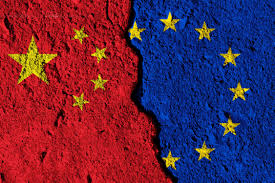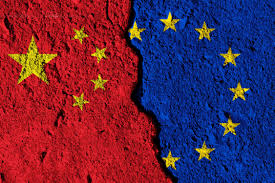
Following the failure of the Group of 20 (G20) climate talks last week, the European Union and China are questioning one another's commitment to battling climate change.
The 20 governments failed to come to an agreement on a joint communique on climate change at the conclusion of last week's negotiations in Bali, Indonesia. According to diplomatic sources, some nations, including China, were dissatisfied with the language that had already been agreed upon and enshrined in prior agreements.
The Glasgow Climate Pact, which concluded two weeks of U.N. negotiations in November, was accused of trying to go back on its commitments by "the biggest emitter on this planet," a reference to China.
"Some of the very, very big players on this planet are trying to roll back from what they had agreed in Glasgow," Frans Timmermans told a meeting in Rotterdam on climate adaptation in Africa.
"And some of them, even the biggest emitter on this planet, try and hide behind developing countries in using arguments that I think, at some point, are no longer viable," said Timmermans, who is executive vice president of the European Commission.
Today, China is the world's largest emitter, accounting for about 30% of all emissions, followed by the United States and the EU. However, historically speaking, the United States has been the largest emitter.
The accusation was rejected by China's Ministry of Foreign Affairs, which added that Beijing demanded a "accurate" reading of previous climate agreements.
For instance, the 2015 Paris Agreement vowed that developed nations would assist developing nations in reducing carbon dioxide emissions as quickly as wealthy nations, whose emissions are largely to blame for global warming. China is classified as a developing country under the Paris Agreement.
"As a developing country itself, China has always stood by the vast number of developing countries and firmly safeguarded their common interests," a spokesperson from the Chinese ministry said.
Tensions in international climate negotiations have increased as a result of wealthy nations' failure to provide promised climate finance. According to OECD data, the EU, a 27-country bloc, is the largest source of climate finance.
China has committed to reaching its emission-peaking level by 2030, a goal that may see its emissions rise in the near future as it opens new coal plants. Beijing has resisted European requests to change this objective to reduce emissions more quickly.
The Foreign Affairs Ministry noted that European nations are burning more coal as they race to replace Russian gas and claimed that China's low-carbon transition remained "firm."
"The green and low-carbon process is now encountering countercurrents," the ministry said, referring to European coal use.
The increase in coal has been described by European policymakers as a temporary measure that won't interfere with climate goals. The EU's goal to reduce net emissions by 55% from 1990 levels by 2030 has been enshrined in law.
(Source:www.usnews.com)
The 20 governments failed to come to an agreement on a joint communique on climate change at the conclusion of last week's negotiations in Bali, Indonesia. According to diplomatic sources, some nations, including China, were dissatisfied with the language that had already been agreed upon and enshrined in prior agreements.
The Glasgow Climate Pact, which concluded two weeks of U.N. negotiations in November, was accused of trying to go back on its commitments by "the biggest emitter on this planet," a reference to China.
"Some of the very, very big players on this planet are trying to roll back from what they had agreed in Glasgow," Frans Timmermans told a meeting in Rotterdam on climate adaptation in Africa.
"And some of them, even the biggest emitter on this planet, try and hide behind developing countries in using arguments that I think, at some point, are no longer viable," said Timmermans, who is executive vice president of the European Commission.
Today, China is the world's largest emitter, accounting for about 30% of all emissions, followed by the United States and the EU. However, historically speaking, the United States has been the largest emitter.
The accusation was rejected by China's Ministry of Foreign Affairs, which added that Beijing demanded a "accurate" reading of previous climate agreements.
For instance, the 2015 Paris Agreement vowed that developed nations would assist developing nations in reducing carbon dioxide emissions as quickly as wealthy nations, whose emissions are largely to blame for global warming. China is classified as a developing country under the Paris Agreement.
"As a developing country itself, China has always stood by the vast number of developing countries and firmly safeguarded their common interests," a spokesperson from the Chinese ministry said.
Tensions in international climate negotiations have increased as a result of wealthy nations' failure to provide promised climate finance. According to OECD data, the EU, a 27-country bloc, is the largest source of climate finance.
China has committed to reaching its emission-peaking level by 2030, a goal that may see its emissions rise in the near future as it opens new coal plants. Beijing has resisted European requests to change this objective to reduce emissions more quickly.
The Foreign Affairs Ministry noted that European nations are burning more coal as they race to replace Russian gas and claimed that China's low-carbon transition remained "firm."
"The green and low-carbon process is now encountering countercurrents," the ministry said, referring to European coal use.
The increase in coal has been described by European policymakers as a temporary measure that won't interfere with climate goals. The EU's goal to reduce net emissions by 55% from 1990 levels by 2030 has been enshrined in law.
(Source:www.usnews.com)














